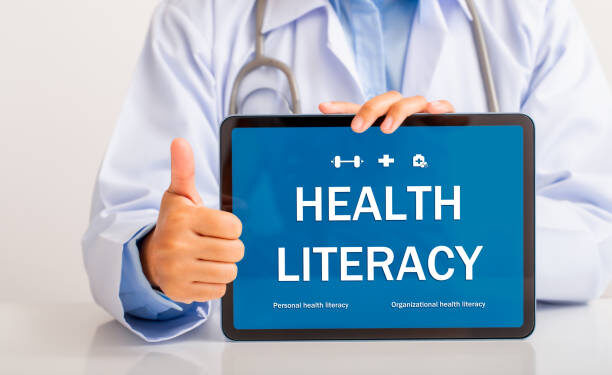Health literacy refers to a person’s ability to get and use health information to make informed decisions about their health. It is a crucial factor in determining health outcomes, as individuals with low health literacy may struggle to navigate the healthcare system and make informed decisions about their health.
The Importance Of Health Literacy And How It Can Lead To Better Health Outcomes?
What is Health Literacy?
Health literacy is the capacity to obtain, comprehend, and apply health information to make educated decisions about one’s health.
It entails reading and comprehension abilities, as well as the capacity to explore the healthcare system, interact effectively with healthcare practitioners, and make educated health decisions.
Low health literacy has been linked to poorer health outcomes, including higher hospitalization and mortality rates. Improving this can lead to better health outcomes and a more empowered patient population.
This is a necessary part of overall health and well-being. It is always about being able to read and understand medical information and also about navigating the complex healthcare system and communicating effectively with healthcare providers.
People with low H.L. may need help understanding their diagnoses, medications, and treatment options, which can lead to poor health outcomes. People can take control of their wellness, and health and make better decisions about their care if they know more about it.
This can lead to better health results, lower healthcare costs, and a community of patients who are more in control of their health.
Low Health Literacy Has A Negative Influence On Health Outcomes
A lack of health literacy has been connected to a variety of negative health effects. Patients with low H.L. are more likely to have difficulty managing chronic conditions, such as diabetes or hypertension, and are less likely to adhere to medication regimens.
They may also be relatively less likely to get preventive care, such as cancer screenings or vaccinations. In addition, low health literacy has been linked to higher rates of hospitalization and more extended hospital stays. Improving H.L. can lead to better health outcomes and a more empowered patient population.
Recommended: Flat Head Syndrome Adults | Comprehensive Guide
Low H.L. can significantly impact a person’s capability to navigate the healthcare system and make informed decisions about their health. Patients with less health literacy may struggle to understand medical terminology. And follow medication instructions, or interpret health information provided by healthcare providers.
This can lead to confusion, frustration, and poorer health outcomes. In addition, low health literacy can contribute to health disparities, as individuals with limited education or language barriers may be more likely to experience low H.L.
By improving H.L. through education and targeted interventions, healthcare providers can empower patients to take an active role in their wellness, and health and improve overall health outcomes.
Strategies For Improving Health Literacy
Several strategies can be implemented to improve health literacy. One approach is to use plain language when communicating health information to patients. This means avoiding medical jargon and using simple, easy-to-understand language.
Another strategy is to provide patients with written materials, such as brochures or pamphlets, designed for their reading level. H.L. can also be improved through patient education programs, which can teach patients about their health conditions.
And how to manage them effectively. Finally, healthcare providers can create a supportive and empowering environment for patients, which can help build trust and encourage patients to take an active role in their own healthcare.
One of the most effective and impressive strategies for improving health literacy is to use plain language when communicating health information to patients. This means avoiding medical jargon and using simple, easy-to-understand language.
Patients are more likely to get known and remember information when presented clearly and concisely. Providing patients with written materials designed for their reading level can also improve H.L.
This can include brochures, pamphlets, or other educational materials that are very easy to read and understand. Patient education programs can also effectively improve health literacy by teaching patients about their health conditions and how to manage them effectively.
Finally, healthcare providers can create a supportive and empowering environment for patients, which can help build trust and encourage patients to take an active role in their own healthcare. By implementing these strategies, healthcare providers can help improve health literacy and promote better patient health outcomes.
The Role Of Healthcare Providers In Promoting Health Literacy
Healthcare providers play an integral role in promoting health literacy among their patients. By using plain language, and providing written materials at appropriate reading levels. And offering patient education programs, healthcare providers can help patients better understand their health conditions.
And how to manage them effectively. Creating a supportive and empowering environment can empower patients to take a proactive role in their healthcare, leading to better health outcomes.
Healthcare providers must prioritize H.L. in their practice to ensure that patients have the knowledge and skills to make informed health decisions.
Healthcare providers can promote health literacy by using plain language when communicating with patients. This means avoiding medical jargon and using words and phrases that patients can easily understand.
Additionally, providing written materials at appropriate reading levels can help patients better comprehend important health information. Patient education programs, such as group classes or one-on-one counseling sessions, can also effectively promote health literacy.
Ultimately, prioritizing health literacy in healthcare can improve patient understanding, engagement, and overall health.
What Are The Benefits Of Improved Health Literacy For Individuals And Communities?
Improved health literacy has numerous benefits for both individuals and communities. Individuals with higher H.L. are relatively more able to engage in preventive health behaviors. Such as getting regular check-ups and screenings, and being better equipped to manage chronic conditions.
They will understand and follow medication instructions, reducing the risk of adverse drug events. In addition, communities with higher health literacy have better overall health outcomes, lower healthcare costs, and improved access to healthcare services.
By prioritizing health literacy, healthcare providers can help improve their patients’ and communities’ health and well-being.
This involves understanding the risks and benefits of different treatments and interventions, as well as being able to navigate the healthcare system and access appropriate care.
Last Words
Hope this article (Health Literacy) clarifies your all confusion and queries. If you really enjoy this article, don’t forget to share Passionfort.com with your friends, Thanks!






![Kentavious Caldwell-Pope Ankle Monitor [KCP] What & Why All Info](https://passionfort.com/storage/2022/01/Kentavious-Caldwell-Pope-Ankle-Monitor-KCP-What-Why-All-Info-120x86.jpg)






